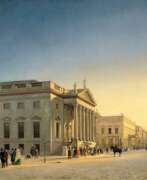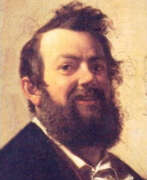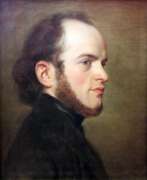Kingdom of Prussia Biedermeier


Johann Philipp Eduard Gaertner was a German painter of the second quarter of the 19th century, the Biedermeier era. He is known as a landscape painter, famous for his views of Berlin and other cities.
Eduard Gaertner created many architectural landscapes of Berlin, as well as St. Petersburg and Moscow during his travels to Russia. The value of these works is that they documented the appearance of the cities on the eve of the age of photography. Gaertner's painting style underwent a change after the death of King Friedrich Wilhelm III, his patron. In keeping with the cultural attitudes of Prussia's new ruler, the artist began to paint more romantic and idealized landscapes in which architecture played a decorative role.


Johann Peter Hasenclever was a German painter of the first half of the 19th century. He is known as a painter, a representative of the Düsseldorf school of art, who is considered one of the founders of German genre painting.
Hasenclever began his work by interpreting biblical, mythological and romantic subjects, but eventually found his calling in humorous scenes from bourgeois life, especially Pyrenean towns and cities. Among his famous works are "The Amusing Examination," "The Reading Room," and "The Trial of Wine," distributed in engravings and lithographs.


Adolph Friedrich Erdmann von Menzel was a German Realist artist noted for drawings, etchings, and paintings. Along with Caspar David Friedrich, he is considered one of the two most prominent German painters of the 19th century, and was the most successful artist of his era in Germany. First known as Adolph Menzel, he was knighted in 1898 and changed his name to Adolph von Menzel.
His popularity in his native country, owing especially to his history paintings, was such that few of his major paintings left Germany, as many were quickly acquired by museums in Berlin. Menzel's graphic work (and especially his drawings) were more widely disseminated; these, along with informal paintings not initially intended for display, have largely accounted for his posthumous reputation.